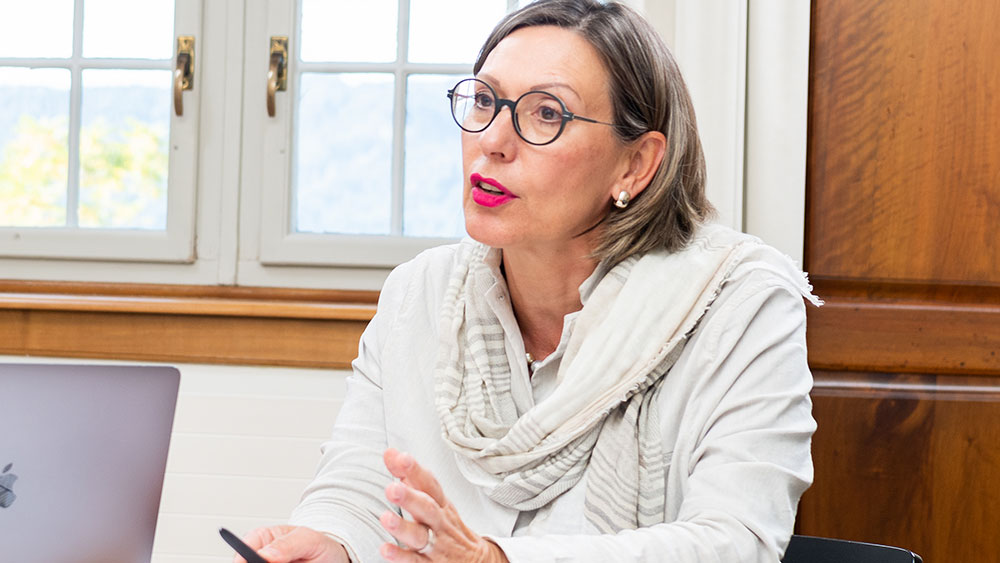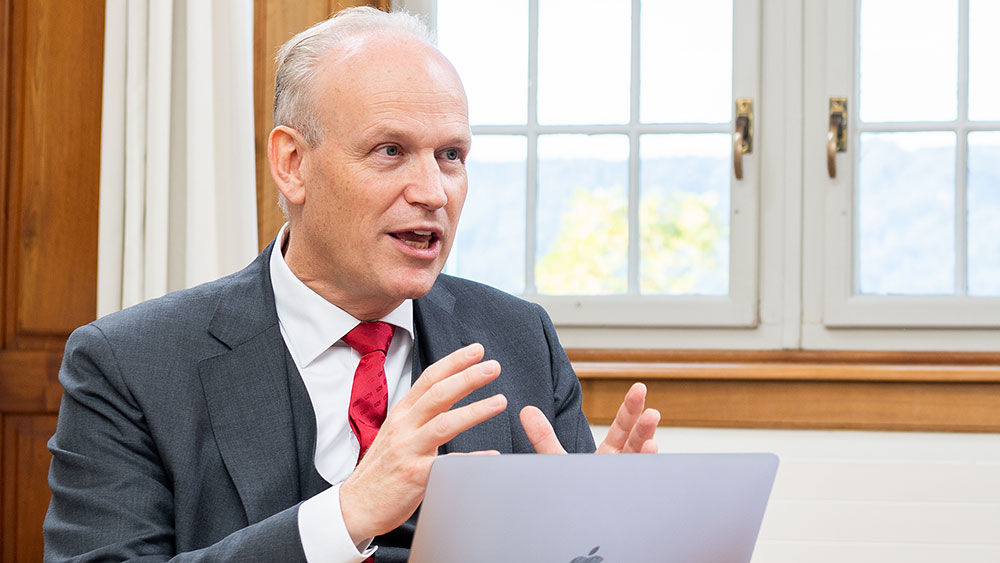“A foundation that holds up even in difficult times”

Two years of pandemic policies brought far-reaching changes to our daily working lives. Despite this, the general level of satisfaction remains high when compared to the first employee survey from 2019. Did this surprise you, Gabriele Siegert?
Gabriele Siegert: Generally our employees are happy to work at UZH. They feel respected, appreciated and trusted in their teams. They have a strong feeling of belonging and connection with UZH. I find it remarkable that the past two years of crisis haven’t changed that, but of course I’m really happy about it as well.
Stefan Schnyder, why do you think the pandemic didn’t make itself felt more strongly in the survey results?
Stefan Schnyder: The survey results show that UZH employees find meaning in their work, feel responsible towards their remit and have very high levels of commitment. This especially strong commitment is a foundation that holds up even in difficult times. Another reason for the good outcome, I think, is that UZH has been spared a lot of problems related to budgeting and job security that have affected other industries.
What do the survey results reveal about UZH’s crisis management during the pandemic?
Gabriele Siegert: We’ll be analyzing the employee survey in more detail for insights into pandemic management so that we can pull out lessons for future crises. What we can already say is that UZH went to great lengths during the pandemic to keep employees abreast of new developments and to facilitate cooperation despite working from home. Another very important aspect was that individual units and teams sought out and found creative solutions for coping with the unusual situation. This gave some teams a real boost.
Stefan Schnyder: UZH reacted swiftly to the changing situation by issuing pragmatic rules on mobile working, which increased our credibility as an employer. Gabriele Siegert, in her role as Interim President, had the right instincts with her approach to crisis management. From the beginning on she set the right priorities, so I have to pay her my greatest compliments. Michael Schaepman took over as the new president in August 2020 and continued managing the crisis very successfully. Here I of course would like to emphasize that we were only able to successfully cope with the pandemic situation due to the incredible dedication of all our employees.
Some scores even improved compared to 2019. For instance, more employees indicated that they can concentrate well at work and aren’t interrupted as often.
Gabriele Siegert: This might be related to the pandemic and the new options that were unlocked for mobile working. When working from home there’s less interruption, which is an advantage. However, a total lack of interruption can’t be the goal. If you work in a team or with students, you have to be willing to get interrupted. We need to be able to concentrate, but we also need to be open for spontaneous, unplanned interactions from time to time. The right balance is needed.
People perceived that their workloads increased during the pandemic, as shown in the survey. Why is that?
Gabriele Siegert: Switching to remote operations during the pandemic brought additional burdens. A lot of instructors, for instance, had to go to great lengths to move their courses online. Then after the corona semesters came the war in Ukraine, with all the accompanying side effects, and now we’re in an energy crisis – this all leads to us still being in a kind of state of exception. A lot of routines don’t work like they used to. This leads to a feeling of increased stress, even after the pandemic.
Stefan Schnyder: One challenge of working from home is maintaining the boundaries between work life and private life. Employees who struggle to maintain this boundary are at risk of feeling depleted. Everyone needs to be able to switch off and regenerate sometimes. When that’s not possible, the team needs to rethink how they organize their work and set priorities. This requires good management, but also for each employee to take personal responsibility. There’s a similar issue when it comes to dealing with digital devices. Digital communication methods make a lot of things easier, but constant availability also carries some risks. People need to consciously set boundaries here. In December 2021, the President of UZH asked employees to switch off their e-mail over Christmas and enjoy a period of digital detox. This was a great signal in the right direction.
High values for equality opportunity and diversity

UZH employees gave high marks to the working culture at the University – even better than in 2019. They feel motivated and appreciated. What is the Executive Board doing to ensure that this positive trend continues?
Gabriele Siegert: Having enough freedom on the job is an important prerequisite for feeling like our work matters. Employees at UZH are often experts in their fields and are best equipped to know what to do and how to do it. At the same time, we do need rules, and the values of the University should be clear, as well as the goals we use to guide our development. We always need to try to strike a balance between freedom and guidelines.
Stefan Schnyder: Part of the working culture also includes striking the right balance between mobile working and working on site. On the one hand, having flexibility in terms of where to work offers a lot of advantages, but on the other hand, being present on site is essential for cultivating a feeling of belonging and team spirit. In May 2022 we introduced guidelines on mobile working which act as an instrument for balancing both of these factors.
The scores for cooperation among professors are lower than among other employees. Is there an explanation for this?
Gabriele Siegert: During the pandemic, the employees in research teams and other UZH units got very creative about how to keep in touch with each other. In contrast, however, a lot of professors probably saw each other and interacted a lot less than usual. I think that ended up being reflected in the survey.
Over the past few years UZH has done a lot in terms of promoting leadership skills. For instance, there’s now an Onboarding Day for newly appointed professors as well as a Management Conference. We’ve also expanded our continuing education course offerings for leaders and managers. Is that reflected in the survey results?
Gabriele Siegert: Taking measures to strengthen leadership and management makes an impact over the long term. It would be too early to draw any conclusions from this year’s survey. We also lack the data we’d need to make direct comparisons, since the leadership questions in this round were formulated in a more explicit and person-focused way than in the previous survey.
Stefan Schnyder: Because the management culture at UZH is very important to us, we’ve commissioned a special analysis of the employee survey on this issue with the aim of getting a more complete picture.
Is the University going to continue its policy of fostering leadership skills?
Stefan Schnyder: Yes. We just took an important additional step by founding the Leadership and Governance Academy, which will serve as an umbrella organization for the various continuing education courses offered to managers at UZH.
What’s remarkably good are the ratings on equal opportunity and diversity – similar to three years ago.
Gabriele Siegert: Yes, but we shouldn’t let ourselves get complacent on this issue. It can be harder to maintain a good level than to reach it in the first place.
For junior academics, satisfaction levels are slightly lower than for other UZH employees. Was that result expected?
Stefan Schnyder: We know that the junior academic career phase is a demanding time in the career of a researcher or scholar. We’re aware that certain aspects of the general situation for junior academics need to be improved. We’re in the process of implementing some measures that will hopefully bring significant progress here, while still taking into account the overall structure and culture of the academic career path. Of course, there are also some expectations that aren’t really realistic. The desire for guaranteed life-long employment isn’t really compatible with the underlying structure of the university system.
Gabriele Siegert: I have great respect for everyone who’s trying to improve the situation for junior academics. Having good general conditions is critical. But one shouldn’t forget that doctoral students and postdocs also bear personal responsibility for their own development – these are adult researchers and instructors, after all.
Compared to three years ago, junior researchers gave higher marks to the visibility of the University’s consulting and advice services. Is this change due to any specific measures?
Gabriele Siegert: In response to the 2019 survey, the Graduate Campus updated their website to include an overview of all advice services and offices, and we also raised awareness among the faculties. We established an Employee Assistance Office for UZH staff as well. However, I hesitate to draw any causal connection between these measures and the survey results. They may be better than in 2019 but they’re still not at the desired level. To get insight into how these measures are working we need to observe how things develop over a longer period of time.
UZH has set clear sustainability goals, which are outlined in the Sustainability Policy and the accompanying implementation policy. Based on the survey results, how do you rate the willingness of the UZH community to cooperate?
Gabriele Siegert: There’s a lot of general agreement and support. A lot of employees think we could be doing even more. But you have to keep in mind that there’s often a gap between people’s professed opinions and the concrete actions they take. You could interpret the survey results as a free pass for introducing very extensive sustainability measures. But are we willing to accept limitations when they impact us directly? I’m not so sure. If sustainability policies directly impact your own work, there’s going to be a conflict. For instance, the question of how many flights are necessary for maintaining international contacts. You need a lot of persistence, creativity and pragmatism to find satisfying solutions in these cases.
According to the survey, many employees don’t see a lot of opportunities to personally contribute to making UZH a more sustainable place.
Gabriele Siegert: I have to admit I was surprised by this result. There are so many ways to do your part, from how you commute to how much paper you use to what kind of eating habits you have. The Sustainability Team at UZH has put together a lot of tips that employees can use to get ideas.
Get into conversation

Did many employees take advantage of the option to leave open-ended comments?
Stefan Schnyder: Compared to 2019 there were a lot more opportunities to leave comments, which our employees fortunately made good use of. We received a lot more comments than last time.
What conclusions has the Executive Board reached based on these comments?
Gabriele Siegert: It’s always interesting to read the comments because they offer deeper insights. You have to be careful when interpreting them, though, as they are individual opinions that can’t easily be generalized to the broader situation.
Stefan Schnyder: There were so many comments that it’s impossible to take all of them into account at the university level. Analyzing comments is mostly useful at institute or department level.
How should individual organizational units at UZH deal with the results?
Stefan Schnyder: We’re asking individual units to systematically review their survey results, to discuss them within the unit and to come up with measures based on the analysis and discussions. This is the clear expectation of the Executive Board. We’ve sent out individual survey result reports and info sheets from HR to managers with instructions on how to proceed. The employee survey is an opportunity for all parts of the University to reflect on strengths and weaknesses as well as opportunities for development.
Gabriele Siegert: I agree. The purpose of the survey is to invite conversation, to listen to one another, to think about areas for improvement – and, not to be forgotten, to celebrate the good results together.